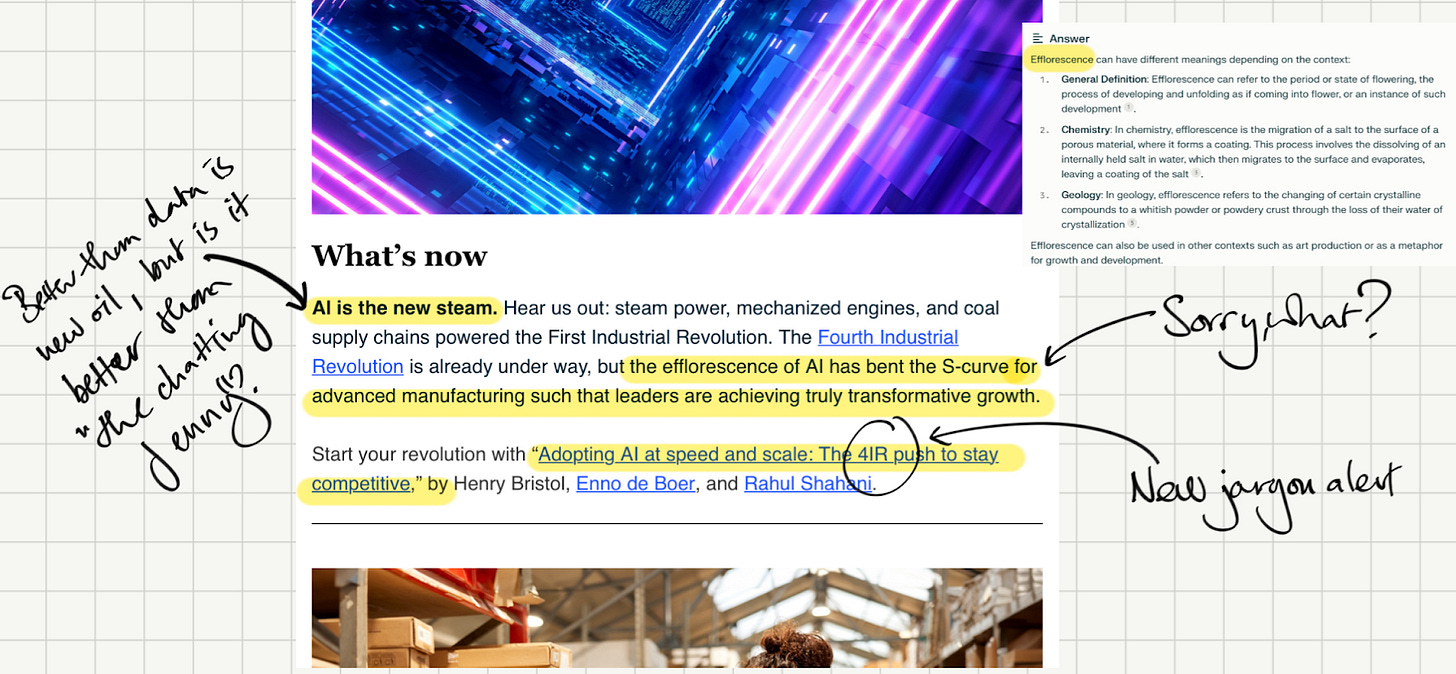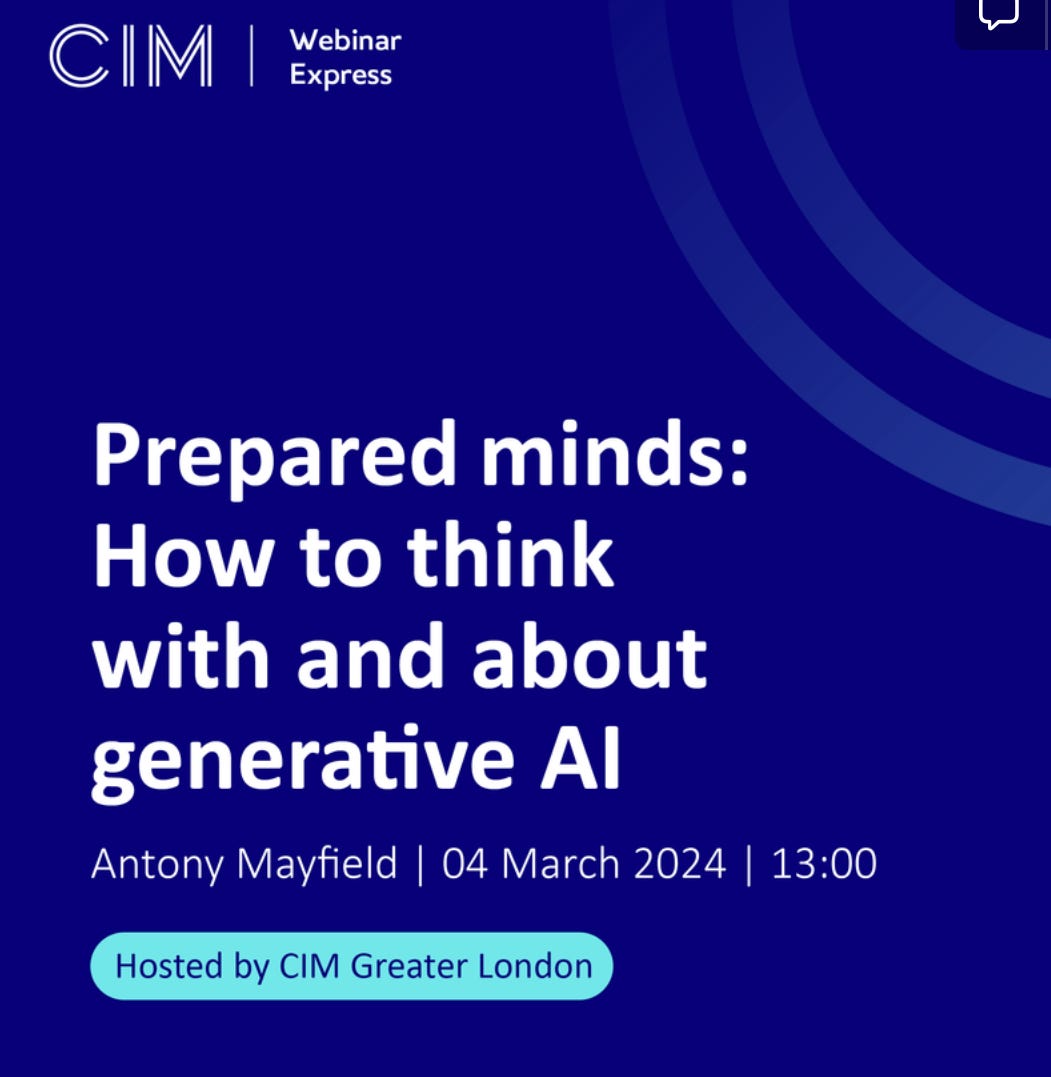Antonym: The Efflorescent Frame Edition
No mind left behind. Also syzygy...
Dear Reader
We’re talking a lot about frames right now. How we shape our reality by seeing it through the best frames we have, and how, when those frames are less useful we need to try new ones.
Here’s a good example of re-framing. Most of us think of tides as when the sea comes and out from the shore. It’s a good frame. It works for us.
But tides don’t go in and out. We move in and out of them. Let Neil deGrasse Tyson explain it for you:
If you didn’t know that already, what did that feel like to shift your point of view? A moment of slight vertigo. Exciting and disconcerting, perhaps. Now you have that frame you can use it when you like, or you can carry on seeing the tide coming in and out and seeing the world as a place that is stable and stationary, with things moving around you.
Here’s another frame. Ideas spring up from places deep inside us and emerge, incandescent, glowing into reality. They are ours, formed in our souls and we own them to do with what we will. We have made laws so that we can own those ideas and say “MINE” if anyone goes near them. Take our idea away and we will sue you, shame you, or just sulk for a very long time.
But ideas don’t come from us. They come to us and move through us. Networks of ideas and inspiration moving through the world, through our cultures and communities and we can fish in them when their tides are high and make things from the ones we catch.
Efflorescent Emails from McKinsey & Co
If you thought that last musing was a little ornate for the usual Antonym style, well in these times of existential uncertainty and weird technologies, maybe that’s going to be the house style for more business-type people. Either the zany zeitgeist or McKinsey’s multiple crises* must have inspired this line in its CEO newsletter:
> “The Fourth Industrial Revolution is already underway. The efflorescence of AI has bent the S-curve for advanced manufacturing such that leaders are achieving truly transformative growth”.
Here’s a little analysis of the section, including a newly spotted acronym jargon for you 4IR (The Fourth Industrial Revolution). Let me know if you see that one in the wild again.
Either micro-dosing has replaced the long-lunch in the 2020s, or someone set the AI editor to haiku mode and forgot to turn it off. (An efflorescence is the unfolding of a flower). The balance of jargon and poetry was so striking I fed “the efflorescence of AI has bent the S-curve” into some AI image generators and Google Advanced Produced something quite lovely (see above).
Snapchat: We’re aren’t social
Seen this week on the Elizabeth Line in London. A display ad for a social media app saying that it isn’t social media. OK.
Advertisement
Sponsor message: Read This week’s BN Edition from Brilliant Noise.
Gaussian splatting
If technical jargon can be grating to the ear, video AI tech has one term that is a delight to say and read “gaussian splatting”. It’s a technique for turning a normal video into a 3D environment that you can then use as a virtual location to make more movies in. The “splatting” as I understand it, is because it creates a framework of blobs instead of pixels. It looks impressive…
And then the sight of the innards of the technique is also kind of weird and beautiful.
Here’s an explainer from some vampiric gentleman:
What is 3D Gaussian Splatting?
Ad:
Some things I learned about using Gen AI this week
Using just one model for work leaves you at the whim of its rules. ChatGPT’s rules can be annoyingly arbitrary. You can get around them or find alternatives. ChatGPT refused to analyse a PDF of an article from a news-site I subscribe to because of copyright. Sometimes if you ask it a few times it effectively says “oh go on then,” and analyses it anyway. The alternative is to use an open-source model like Mistral Medium that will do the job anyway.
Open source Gen AI tools are improving. Mistral Medium, one of the models from the French OpenAI competitor Mistral, is very effective. I’ve used it to analyse PDFs. Example prompts:
“Read this PDF carefully and create a taxonomy of the concepts in it.” This gives a sense of the whole of a document, where a simple summary might miss important points you’re interested in.
“Please extract the text from this PDF and present it as an outline.” Another alternative to summarising, you can then use other tools to analyse the text.
Poe is the least talked about but most useful AI app. ChatGPT Premium is still the default best all round AI tool for most people most of the time. If you’re experimenting more but aren’t technical (able to code etc), adding Poe can be very useful. The two main features are:
Easy access to many Gen AI models. Currently, Poe lets you use 30+ different AIs, including different versions of ChatGPT, Anthropic, Google Gemini and versions of open source models like Llama and Mistral.
It’s easy to create custom AI chatbots. You can add some data of your own and a prompt and run your own bot. It’s really easy. For instance, I set up a chatbot powered by ChatGPT with all of the available advice and rules for a grant application for a friend, which allowed them to ask questions as they developed their proposal without worrying about the complex guidelines. ChatGPT Premium offers something similar at the moment – its GPT store – but on the Poe app you can build versions anyone can use even without a subscription, and also you can experiment with different AI models as the engine for your helper bots.
This week I’ve been…
Watching…
Kin (BBC iPlayer). Season two takes a tense situation for the Dublin crime family and then throws in a hand grenade in the form of a relative newly released from prison, Bren, played by Francis Magee at the absolute top of his terrifying game. If you haven’t seen it then you’ve a massive treat waiting for you.
True Detective: Night Country. (Sky / Now TV) Still so confused at the end, despite a few excellent plot twists. I gave up on the plot a while ago and just settled in to enjoy the vibe and the performances of Jodie Foster and Kali Reis.
And that’s all for this week, folks. There’s so much more I’d like to have included, but I hope you found something in the bits I’ve included that you liked.
Antony
Footnotes
* [Perplexity] The McKinsey consulting firm has faced scrutiny over its work with authoritarian governments, including China. McKinsey's involvement with the Chinese government includes advising state-owned companies and being linked to controversial projects such as internment camps for Uighurs in Xinjiang. The firm's work for both authoritarian governments and the Pentagon has raised concerns about conflicts of interest and potential harm to US security[1][2][3]. Despite McKinsey's claims that it does not serve political parties, its work with Chinese state-owned enterprises has drawn criticism from lawmakers like Senator Rubio, who raised concerns about potential conflicts of interest that could jeopardise national security[4][5].
Citations:
[1] https://www.nytimes.com/2018/12/15/world/asia/mckinsey-china-russia.html
[2]https://responsiblestatecraft.org/2023/02/03/do-mckinseys-defense-contracts-clash-with-foreign-clients/
[3] https://www.nbcnews.com/politics/national-security/advising-both-chinese-state-companies-pentagon-mckinsey-co-comes-under-n1283777
[4] https://www.nbcnews.com/politics/national-security/mckinsey-worked-chinese-government-assurances-us-senator-document-indi-rcna9053
[5] https://www.nationalreview.com/corner/mckinsey-reveals-deeper-ties-to-chinese-government-than-it-previously-admitted/










